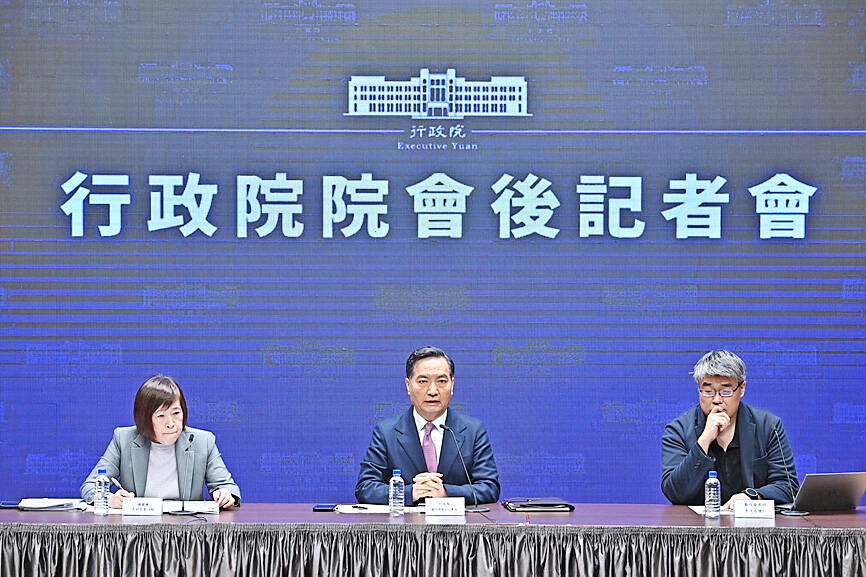The Executive Yuan yesterday said it would soon propose an amendment to the Personal Data Protection Act (個人資料保護法) to toughen sanctions for individuals or private businesses that fail to adopt cybersecurity measures and cause personal data leaks, adding that a new agency is to be established to address personal data protection issues.
The National Development Council proposed three strategies to bolster personal data protection in the private sector after leaks were reported at China Airlines, Breeze Center and vehicle-sharing platform iRent, Executive Yuan acting spokesman Lo Ping-cheng (羅秉成) said.
The strategies were approved at a Cabinet meeting, including increasing fines for contravening the act, establishing an independent agency to oversee personal data issues and improving communication among government agencies in handling leaks of personal data, Lo said.

Photo courtesy of the Executive Yuan
The council’s briefing to the Cabinet also said that the Ministry of Digital Affairs would help government agencies establish teams to conduct annual inspections of businesses that are highly susceptible to such breaches.
Agencies would be obligated to report to the council and the ministry within 24 hours of a breach at a private business under their oversight, it said.
The agencies should complete an administrative investigation of the breach within three days and complete a report within 10 days, it said.
The Cabinet should convene a meeting within two weeks to be briefed about the investigation, explain the incident to the public and order individuals or businesses to address the data breach within a set time, it said.
“We would set the definition for major personal data breaches based on the quantity and nature of the data involved, and whether similar situations have repetitively and frequently occurred,” council Deputy Minister Kao Shien-quey (高仙桂) said. “We would take high-risk retailers listed by the National Police Agency into consideration when we define major data breaches.”
Currently, individuals and businesses face fines of up to NT$200,000 for a personal data leak incident, Kao said.
The proposed amendment would stipulate higher fines based on company revenue and its fixed capital, as well as who was involved in the breach, she said.
“We will also look at fines for data breaches in the Cyber Security Management Act (資通安全管理法), Human Biobank Management Act (人體生物資料庫管理條例) and other acts when resetting penalties,” she added.
The new agency in charge of personal data protection issues would be similar to the Taiwan Transportation Safety Board, which conducts independent investigations into major transportation incidents, Lo said.
In addition to the Personal Data Protection Act, the Executive Yuan would amend clauses of the Cyber Security Management Act and the Organizational Act of the Executive Yuan (行政院組織法), Lo said, adding that the amendments would be delivered to the legislature to be deliberated in this legislative session.
Separately yesterday, Chinese Nationalist Party (KMT) Legislator Lai Shyh-bao (賴士葆) urged the digital affairs ministry to establish security credentials for government Web sites.
The ministry should also prevent personal data from being sold cheaply on the dark Web, Lai said.
“The government has about 805,000 Web pages, many of which do not have security credentials,” he said. “This has made them easy targets for hackers.”

ANOTHER EMERGES: The CWA yesterday said this year’s fourth storm of the typhoon season had formed in the South China Sea, but was not expected to affect Taiwan Tropical Storm Gaemi has intensified slightly as it heads toward Taiwan, where it is expected to affect the country in the coming days, the Central Weather Administration (CWA) said yesterday. As of 8am yesterday, the 120km-radius storm was 800km southeast of Oluanpi (鵝鑾鼻), Taiwan’s southernmost tip, moving at 9kph northwest, the agency said. A sea warning for Gaemi could be issued tonight at the earliest, it said, adding that the storm is projected to be closest to Taiwan on Wednesday or Thursday. Gaemi’s potential effect on Taiwan remains unclear, as that would depend on its direction, radius and intensity, forecasters said. Former Weather Forecast

As COVID-19 cases in Japan have been increasing for 10 consecutive weeks, people should get vaccinated before visiting the nation, the Centers for Disease Control (CDC) said. The centers reported 773 hospitalizations and 124 deaths related to COVID-19 in Taiwan last week. CDC Epidemic Intelligence Center Director Guo Hung-wei (郭宏偉) on Tuesday said the number of weekly COVID-19 cases reported in Japan has been increasing since mid-May and surpassed 55,000 cases from July 8 to July 14. The average number of COVID-19 patients at Japan’s healthcare facilities that week was also 1.39 times that of the week before and KP.3 is the dominant

The Chinese Communist Party’s (CCP) working group for Taiwan-related policies is likely to be upgraded to a committee-level body, a report commissioned by the Mainland Affairs Council (MAC) said. As Chinese President Xi Jinping (習近平) is increasingly likely to upgrade the CCP’s Central Leading Group for Taiwan Affairs, Taiwanese authorities should prepare by researching Xi and the CCP, the report said. At the third plenary session of the 20th Central Committee of the CCP, which ended on Thursday last week, the party set a target of 2029 for the completion of some tasks, meaning that Xi is likely preparing to

US-CHINA TRADE DISPUTE: Despite Beijing’s offer of preferential treatment, the lure of China has dimmed as Taiwanese and international investors move out Japan and the US have become the favored destinations for Taiwanese graduates as China’s attraction has waned over the years, the Ministry of Labor said. According to the ministry’s latest income and employment advisory published this month, 3,215 Taiwanese university graduates from the class of 2020 went to Japan, surpassing for the first time the 2,881 graduates who went to China. A total of 2,300 graduates from the class of 2021 went to the US, compared with the 2,262 who went to China, the document showed. The trend continued for the class of 2023, of whom 1,460 went to Japan, 1,334 went to